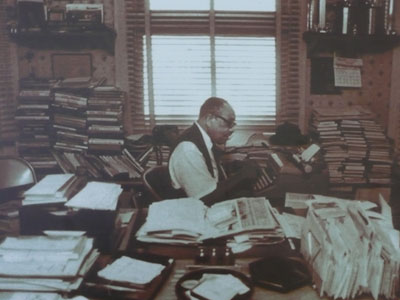John Hiram Jackson was born November 16, 1912 in Pittsburgh, Pennsylvania. Both his parents were Virginians, and his maternal grandfather, the Reverend Daniel Cave, was a founder of Lynchberg Seminary, an independent black Baptist college. Reverend Cave was the first of a line of Baptist minister ancestors that went back four generations.
The Jackson family enjoyed a middle class lifestyle until the death of John’s father, who had worked for the city of Pittsburgh. He was forced to give up football and track and worked at a drug store while he attended Peabody High School. Delivering prescriptions exposed Jackson to the lives of the poor, and their suffering was a lesson he never forgot. Contact with doctors and pharmacists forged a desire for education, and he enrolled at Duquesque University in Pittsburgh in 1930 but left after three years when his college funds, laboriously saved, were lost in the banking crisis of 1933. He also studied briefly at Virginia Union University in Richmond while serving as pastor of the First Baptist Church of Greenwich, Connecticut.
In 1940 Jackson graduated from the University of Pittsburgh and five years later earned a Bachelor of Divinity degree from Union Theological Seminary in New York in 1945. A Masters of Education degree from University of Pittsburgh followed in 1957.
In 1959 Jackson moved to the Northwest, settling first in Seattle before moving to Portland in 1964, where he served as pastor of Mt. Olivet Baptist Church until his retirement in 1987.
Jackson’s ministry and social activism fused a personal faith in God with a belief that God’s faith in man was a reason for hope and optimism. He was active in civil rights demonstrations from his youth in Pittsburgh. In 1957, as a delegate from the Pittsburgh chapter of the NAACP, he participated in a prayer pilgrimage and march in Washington D.C., where he met Martin Luther King, Jr. He saw King on at least three more occasions, including the March on Washington in August 1963.
In Portland, Jackson played a leading role in the civil rights struggle. He was active in the Albina Ministerial Alliance, The Urban League, One Church One Child, and the National Association for the Advancement of Colored People (NAACP) and many other organizations. Rev. John Hiram Jackson died in Portland in 1997.
As a fellow activist remarked after Jackson’s death, “I never met anybody in my life like him who could combine the pastoral sentimentality with the hard, raw political facts of a community trying to get out of the hole.” Among organizations honoring him for his activism were the YMCA, Albina Women’s League, Portland Public Schools, the Housing Authority, Metropolitan Human Relations Committee, and the Black United Front.

